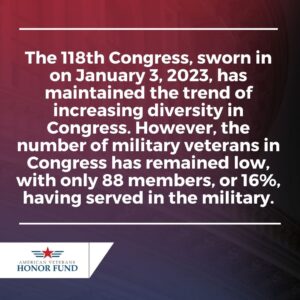In recent years, the US Congress has seen a significant increase in gender and racial diversity. However, this progress has not been mirrored in the number of military veterans serving in Congress. Despite a history of military service being seen as an advantage in political campaigns, the number of military veterans in Congress has steadily declined for the past few decades.
According to the Pew Research Center, the 117th Congress, sworn in on January 3, 2021, is the most racially and ethnically diverse in history. Women also make up a record-breaking 27% of Congress. However, the number of military veterans in Congress is at a record low, with just 91 members, or 17%, having served in the military.
The 118th Congress, sworn in on January 3, 2023, has maintained the trend of increasing diversity in Congress. The Congress has a record-breaking 28% women, and the number of Black, Hispanic, and Asian American lawmakers has also increased. However, the number of military veterans in Congress has remained low, with only 88 members, or 16%, having served in the military.

This decline in military veterans in Congress starkly contrasts previous eras. In the 1970s, more than 70% of Congress had military experience. This number has steadily declined since then, with a slight uptick during the post-9/11 era. However, even during that time, the percentage of military veterans in Congress never surpassed 25%.
Military veterans bring valuable skills and experience to Congress that are critical for effective governance. Their service in the military instills a deep sense of duty, discipline, and sacrifice that translates well into the political arena. Veterans often have a unique perspective on national security, foreign policy, and the military that can inform and improve policy decisions. Furthermore, their experience leading and working in diverse teams under high-stress situations makes them well-suited for Congress’s collaborative and fast-paced environment.
Despite the decline in military veterans in Congress, some notable veterans still serve in Congress. For example, Senator Tammy Duckworth of Illinois is a Purple Heart recipient who lost both legs while serving in Iraq. Representative Dan Crenshaw of Texas is a former Navy SEAL who lost an eye while serving in Afghanistan. Duckworth and Crenshaw have used their military service to connect with voters and emphasize their dedication to public service.
So what are the implications of the decline in military veterans in Congress? More veterans in Congress could lead to better decision-making on national security issues. Veterans have firsthand experience with the military and can provide valuable insights into military strategy, budgeting, and personnel issues.
Others argue that military service should not be a prerequisite for serving in Congress. Congress should represent the American people as a whole, and while military service is a noble and vital profession, it is just one of many ways to serve one’s country.
The declining number of military veterans in Congress is a trend that has been ongoing for decades. While gender and racial diversity in Congress have reached new heights, the percentage of military veterans serving in Congress is at a record low. While some argue that having more veterans in Congress could lead to better decision-making on national security issues, others say that Congress should represent the American people, regardless of military service. Irrespective of where one stands on this issue, it is clear that the decline in military veterans in Congress is a trend worth watching.


